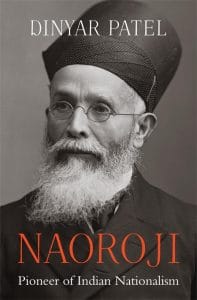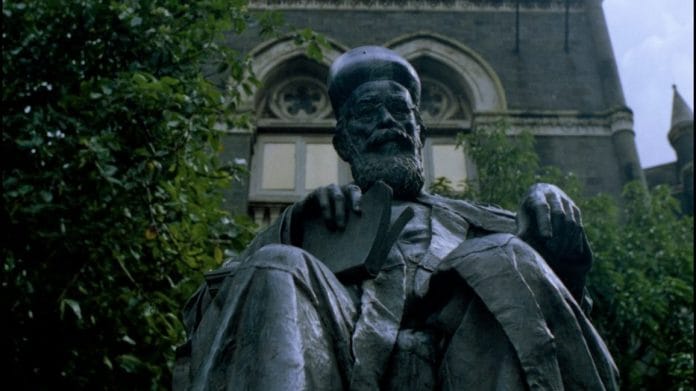In Dadabhai Naoroji’s formulation, the Indian civil service—and, specifically, the lack of a significant number of Indians in this administrative corps—was the primary reason for Indian impoverishment. He posited a direct link between the preponderance of Britons ruling the country and the scale of the drain of wealth; this, in a nutshell, was the political corollary to the drain theory. For Naoroji, therefore, civil service reform was a subject of vital economic importance, a matter of life or death to millions of famine-weary Indian peasants.
Naoroji did not enunciate the political corollary until the 1870s. How- ever, we can trace its roots back to his maiden political speech, delivered at the inauguration of the Bombay Association in August 1852. In this speech, Naoroji, then in his late twenties, suggested a link between faulty governance and poverty. The impoverishment of the Kunbis or peasants, he noted, might be the product of “bad administration.” Government administrators, “being drawn from England, do not, except after a long residence and experience, become fully acquainted with our wants and customs.” Consequently, these British officers were “often led, by their imperfect acquaintance with the country, to adopt measures calculated to do more harm than good.” The solution, therefore, was to recruit knowledgeable Indians for government service. In 1859, four years after relocating to Great Britain, Naoroji took up the case of the very first Indian candidate for the civil service, Rustomji Hirjibhai Wadia, who was unceremoniously barred from taking the service’s entrance examination by the India Office’s last-minute reduction of the age limit.
Although in Wadia’s case his pleas to authorities fell on deaf ears, Naoroji persisted in speaking and writing about the need for more Indian administrative officers. Like many other political reformers in Calcutta, Bombay, Madras, and elsewhere, he concentrated his energies on protesting against the formidable difficulties faced by Indian candidates: a low age limit; the fact that exams were only held in England, necessitating a long and costly voyage from the subcontinent; and the content of the exams, which privileged knowledge of European classics and literature over subjects such as Arabic and Sanskrit, where Indian candidates would have a significant advantage. Indian agitation led to some official concessions. In 1865, the India Office reversed its decision to further deemphasize Arabic and Sanskrit in exams after Naoroji submitted a petition on the topic, questioning the government’s commitment to fairness for aspiring Indian officers. Naoroji increasingly framed the civil service issue as one of Indian rights, dropping his earlier arguments about the problematic consequences of an Indian administration dominated by Britons unfamiliar with Indian culture and opinion.
Also read: Nehru told Raja Rao: Enough of Rama, Krishna — 3,000 yrs of deities got us slavery, poverty
Naoroji’s 1867 address before the East India Association, “England’s Duties to India,” represented another important transformation in his views about how the civil service caused poverty. It was at this moment that Naoroji suggested, for the first time, that India’s impoverishment was the result of a pronounced economic drain. While he did not use the term “drain” specifically—he spoke of financial tribute and “home charges”— Naoroji asserted that British rule had resulted, to date, in the transfer of a whopping £1.6 billion from the subcontinent to imperial coffers. Re- lying on parliamentary returns, he calculated that Great Britain continued to siphon, conservatively, £33 million each year from its Indian possessions, or roughly one-fourth of tax revenues collected in India.29
The drain and its devastating impact upon India constituted the first half of his paper. In the second half, Naoroji dwelled on the political injustice that Indians faced under British rule, with the civil service as the main grievance. “Either the educated natives should have proper fields for their talents and education opened to them in various departments of the administration of the country,” he warned, “or the rulers must make up their minds, and candidly avow it, to rule the country with a rod of iron.” The best way to secure Indian officers was with simultaneous examinations; in other words, ensuring that the exams of “a portion, however small at first,” of candidates take place in India as well as Britain. Thus Naoroji continued to think of civil service reform mostly in terms of the rights of Indians. But he made one critical observation: that a European- dominated civil service was a major source of the drain, since these Britons regularly sent portions of their salaries home and also drew pensions after they retired to the British Isles. Examining government revenues, Naoroji tallied the salaries of British bureaucrats, administrators, and soldiers, concluding that India annually lost about £4.36 million through remitted salaries. This was, of course, far short of his calculations for the total annual drain, and Naoroji therefore had to account for additional sources. He suggested a profoundly unfavorable trade imbalance. In a later paper, delivered after the Abyssinian War, where Great Britain borrowed Indian troops and then served Indian taxpayers with a bill for expenses, Naoroji placed blame upon the great costs of maintaining a large military. By 1871, he was focusing on land tenure, arguing that unduly high rates of assessment were imperiling both zamindars (landlords) and ryots (peasants).
During the late 1860s and early 1870s, Naoroji’s proposed solutions to the drain were relatively limited in scope. Somewhat incredibly, he believed that part of the drain was justified. In exchange for the supposed political, moral, and social benefits of British rule, it was “inevitable” that India had to sacrifice some of its wealth. “If India is to be regenerated by England, India must make up its mind to pay the price,” Naoroji reasoned. The critical problem was that the drain, while impoverishing ordinary Indians, also sapped India of capital that could otherwise support indigenous commerce and industry and, consequently, lighten the effects of this financial tribute. If India were economically more robust, it would be easier for the country to bear the burden of what he termed the “legitimate portion of the drain.”
In order to further clarify this relationship between the drain, capital, and Indian poverty, Naoroji turned to John Stuart Mill’s Principles of Political Economy. “Land and labour are both useless unless we have sufficient capital,” he stated. “Mr. Mill distinctly proves that industry is limited by capital, that law and government cannot create industry without creating capital. Capital, then, is the great and imperative want of India, as much for the existence of the foreign rule as of the people themselves.” Since the drain robbed India of its own capital, Naoroji suggested that Great Britain finance, through long-term loans, major public works projects in the country to stimulate growth. “If sufficient foreign capital is brought into the country,” he declared, “all the present difficulties and discontent will vanish in time.” Naoroji put particular faith in the transformative effects of railways, irrigation projects, and similar “large public works.”
While speaking on the drain and championing a solution through public works, Dadabhai Naoroji did not lose sight of civil service reform. In addition to vigorously challenging British allegations that Indians were not mentally fit, capable, or trustworthy enough to hold high administrative positions, he sketched out plans for steady Indianization of the services. These plans became more ambitious with time. In 1868, he held out hope that the British majority in the services could be reduced to two- thirds or three-fourths, while allowing that “certain places of high executive power should remain in their hands only.” Naoroji categorically dismissed any moves toward self-government and the eventual transfer of all administrative posts to Indians. “In my belief,” he asserted, “a greater calamity could not befall India than for England to go away and leave her to herself.”
But his evolving demands for Indianization of the civil service betrayed a different sentiment. In 1871, while addressing a select parliamentary committee in London, he discarded his earlier stance that “high executive power” should be the sole province of the British. Instead, Naoroji now called for the appointment of Indians to legislative councils, the India Office, and “all grades” of the government.
It was a simple question of government efficiency: how, Naoroji asked, was it possible for British officials, who rotated in and out of the country, to properly administer an entire subcontinent? This system, furthermore, denied Indians any opportunities to gain experience in governance and administration. Here we see the germ of what Naoroji later termed the “moral drain”: the loss of administrative experience whenever a British official retired and left India, further condemning India to misgovernance. Indianizing the civil services could, therefore, remedy a drain that had both moral and financial components. Importantly, for Naoroji, civil service reform was no longer just a question of Indian rights.
 This excerpt from Naoroji: Pioneer of Indian Nationalism by Dinyar Patel has been published with permission from Harper Collins.
This excerpt from Naoroji: Pioneer of Indian Nationalism by Dinyar Patel has been published with permission from Harper Collins.
Also read: Jamsetjee Framjee Madon — a pioneer of Indian cinema and champion of Calcutta’s poor Parsis







Superb article